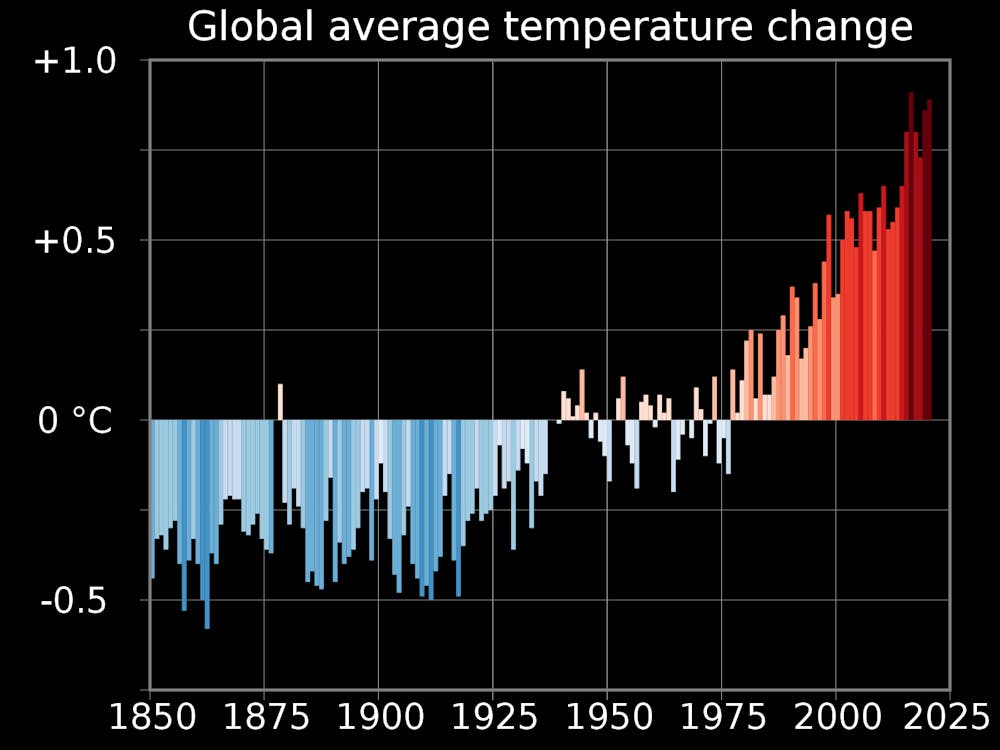By Aliyah Siddiqui
Nation and World Editor
The European Union’s Copernicus Climate Change Service announced that this October was the warmest in global recorded history, with the average surface air temperature being 0.85ºC higher than that from the past 30 years. While the change may not seem significant, global average temperatures have risen by 1.43ºC above pre-industrial temperatures, an increase dangerously close to the Paris Agreement goal of limiting global temperatures to 1.5ºC. If this benchmark is surpassed, the United Nations predicts increasingly severe climate impacts.
“October 2023 has seen exceptional temperature anomalies, following on from four months of global temperature records being obliterated,” Samantha Burgess, Deputy Director of the Copernicus Climate Change Service, said. “The sense of urgency for ambitious climate action going into COP28 has never been higher.”
In the past year, 90% of people globally, including 49% of people living in the U.S., experienced at least 10 days of temperatures related to climate change, according to a report from Climate Central. For example, Houston, Texas, which has over 1 million people, experienced 22 days of extreme heat that was linked to carbon pollution. Santo Domingo and Santiago in the Dominican Republic also experienced 79 days and 56 days respectively of extreme heat.
“This is the hottest temperature that our planet has experienced in something like 125,000 years,” Andrew Pershing, Climate Central’s vice president, said. “This is not normal. These are temperatures that we should not be experiencing.”
Scientists attribute a number of factors to the increase in temperature, including carbon pollution from burning coal, oil and natural gas. The U.N. World Meteorological Organization also points to El Niños contributing to a further increase in temperature. These natural phenomena occur when warm waters come to the surface, releasing more heat into the atmosphere, and are fueled by increased greenhouse gasses. Due to El Niño events, the U.N. warns that more heatwaves, floods or heavy rains could occur, affecting both agriculture and marine life.
“It’s so much more expensive to keep burning these fossil fuels than it would be to stop doing it. That’s basically what it shows,” Friederike Otto, a climate scientist at the Imperial College London, said. “And of course, you don’t see that when you just look at the records being broken and not at the people and systems that are suffering, but that - that is what matters.”
Already, climate change has had a devastating impact on lives throughout the world. In the past two months, Mexico experienced a hurricane that left at least 100 dead or missing, and Brazil experienced a cyclone that affected tens of thousands of people. Severe flooding has also occurred in many parts of the U.S., including New Jersey, and the world, such as India or Libya, killing thousands of people and injuring more.
Despite the prevalence of these natural disasters and increasing alarm from rising temperatures, scientists remain hopeful that the climate crisis can be slowed. At the upcoming United Nations Climate Change Conference, world leaders will continue to address the effects of the climate crisis and evaluate countries’ statuses in achieving the 1.5ºC goal.
“We must not let the devastating floods, wildfires, storms, and heatwaves seen this year become the new normal,” Piers Forster, a climate scientist at University of Leeds, said in an interview with Reuters. “By rapidly reducing greenhouse gas emissions over the next decade, we can halve the rate of warming.”







